Natural Home Cleaning for Beginners (+5 Easy DIY Recipes)
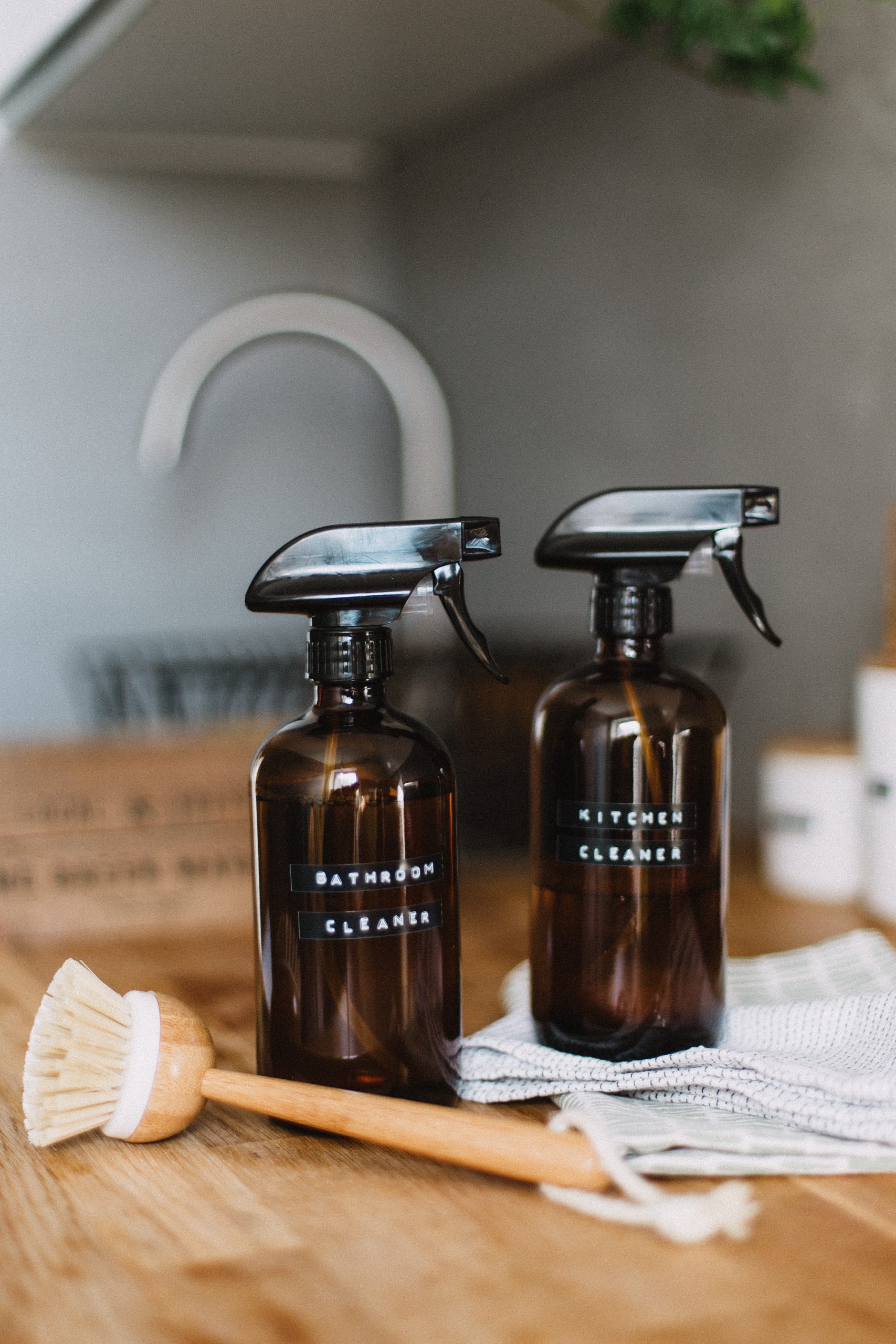
I’ve been trying to make as many things from-scratch as I can around my home. At first, my main focus had been on food, such as bread, butter, yogurt, biscuits, etc. It took me a while to realize that this from-scratch vision of my home that I wanted was not only limited to foods, but also to natural home cleaning products and bath products as well!
And let me tell you: It took some serious trial and error to find recipes for all-natural cleaning products that genuinely worked. Some are still being tested (such as my laundry detergent) and some were complete failures and put on the back burner for another day (looking at you, dishwasher detergent).
But the five recipes outlined below — all-purpose spray, carpet powder, dish soap, air freshener, and wood polisher — are five that I use on a weekly (if not daily) basis. They’re tried and true recipes that I hope you will love as much as I do.
I’ve also included the most common ingredients used in natural cleaning products, as well as some of the science behind them. If you’re anything like me, you like to know why something does what it does before you trust it to clean your home!
Since using these cleaning products, I’ve loved being able to look under my sink and see a cabinet of soaps, baking soda, vinegar, and essential oils — instead of a cabinet of harsh, dangerous chemicals. For those who have children, having your cleaning cabinet be full of non-toxic, natural ingredients instead of chemicals like bleach and ammonia, can help to relieve some stress of kids getting into it.
So if you’re looking for some natural, safe cleaning solutions, keep reading below!
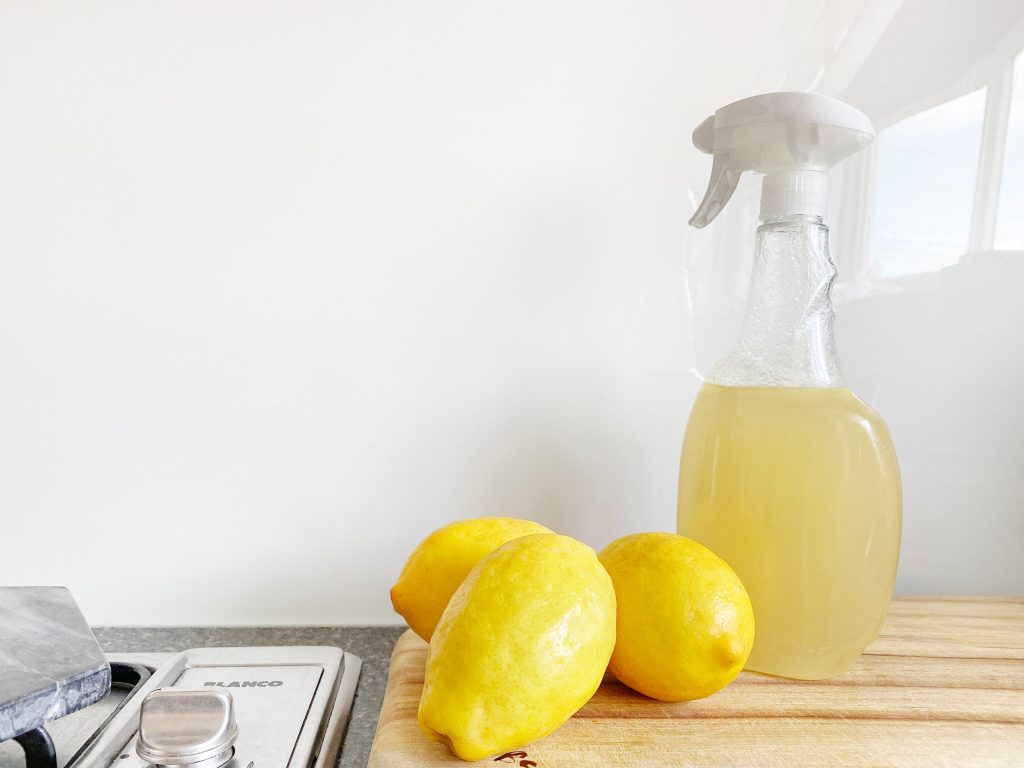
Why Go Natural?
There are many reasons why someone may want to opt for more natural, homemade cleaning recipes vs. store-bought chemical cleaners, such as wanting a more eco-friendly solution. Some people move toward homemade cleaners as a way of saving money, as many store-bought cleaners are more expensive than their homemade counterparts.
Perhaps the biggest reason that people prefer to have all-natural homemade cleaners is for the health risks associated with store-bought chemical cleaners. Many cleaning products, such as detergents, degreasers, disinfectants, and all-purpose cleaners can contain many chemicals that are harmful to one’s health.1 Some of these chemicals include formaldehyde, chlorine, ammonia, etc.
The American Lung Association warns against many cleaners, stating that “some products release dangerous chemicals, including volatile organic compounds.”2 These VOCs are chemicals that are released from using cleaning products, and they are known to contribute to respiratory problems, allergic reactions, and headaches. Many cleaners that contain VOCs include: Aerosol sprays, chlorine bleach, detergent, dish soap, rug cleaners, furniture and floor polish, oven cleaners, and more.
With all this information about the potentially harmful chemicals that are in store-bought cleaning products, many choose to create their own cleaning products using nontoxic, health-friendly ingredients.
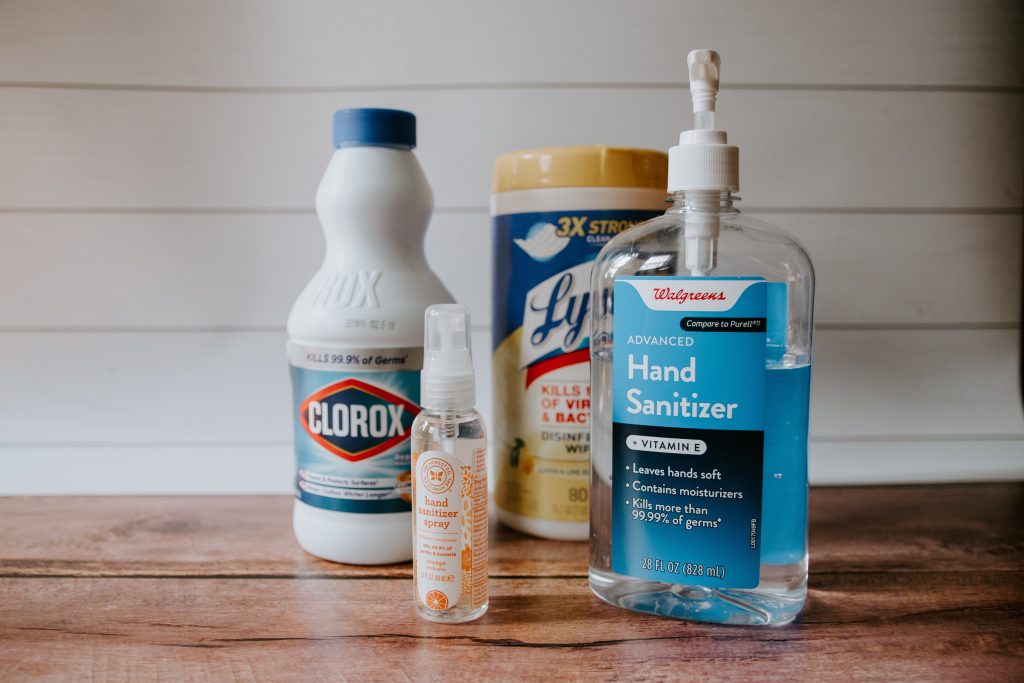
Do Natural Cleaning Products Work?
The answer is: Yes! Natural cleaning products work incredibly well at cleaning your home. There are a few things to consider, such as that they may not be as powerful as store-bought cleaners. Store bought cleaners have degreasers and other chemicals in them to help boost their cleaning power. Homemade cleaners just don’t have that which is great if you’re trying to reduce the amount of chemicals you are exposing yourself and your family to.
You also need to be careful with what you use to clean certain areas of your house. Vinegar, for example, should never be used on cast iron or granite countertops (more is detailed below). If you need to disinfect a surface, hydrogen peroxide would be your go-to, versus a vinegar solution.
Just because these products are natural does not mean that they can be mixed together without proper research. For example, you should never mix vinegar and hydrogen peroxide together, as toxic vapors can result. Always do your own research before making a homemade cleaning product.
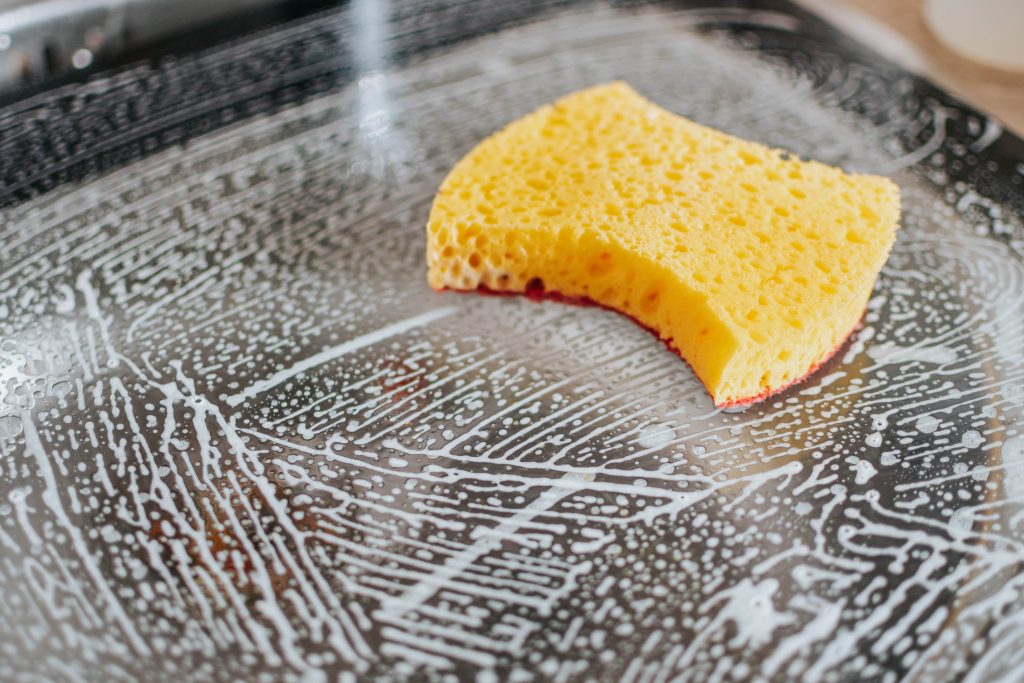
Common Ingredients in Home Cleaning Recipes
Vinegar
When it comes to natural home cleaning, vinegar is easily at the top of the list! Distilled white vinegar is incredibly acidic, with a pH of 2.4.3 This means that it is more acidic than coffee or orange juice, but still less acidic than lemon juice or the acids in your stomach. Because vinegar is so acidic, it’s a great cleaner. The acid helps to cut through buildups, brines from hard water, or even glue residue left from stickers.
Vinegar can even help to break down and get rid of some types of bacteria. It’s important to remember though, vinegar is not a disinfectant, and there is no evidence that it can get rid of pathogens such as salmonella. However, for use around the home, vinegar mixed in a 1:1 ratio of water cleans and shines just fine. It can be used on glass, windows, walls, cupboards, floors, sinks, stovetops, and coffee makers. It’s advised to not use it on surfaces that get a lot of contact with food, and instead use a sanitizer in those places.
When using vinegar to clean, it’s recommended to let it set for up to thirty minutes. For example, if you are trying to clean pots and pans stained with food, soak them in a vinegar-water mixture for 30 minutes, and then wash in hot water and soap.
There are some surfaces that vinegar should not be used on. Natural stone such as granite, marble, limestone or others, vinegar can cause dulling, scratching, pitting, even possibly dissolve the surface slowly over time. It is also not recommended for use on wood, cast iron, or aluminum. Vinegar can also stain fabrics, so it’s recommended to test it on a scrap of fabric before use. Make sure to do your research to see if vinegar will be safe to use on your household surfaces prior to use.
Most importantly, never combine vinegar with bleach or hydrogen peroxide. Toxic vapors can result when they are mixed.
Hydrogen Peroxide
Hydrogen peroxide is another great product for cleaning. It is anti-bacterial, anti-fungal, anti-mold, anti-mildew, and disinfects and deodorizes surfaces!4
It is safe to use on everything from cutting boards to your dishwasher. It’s also great for cleaning everywhere in the bathroom, as it helps to lift stains from grout, tile and toilet bowls.5
Keep in mind when using hydrogen peroxide to never mix it with vinegar, as it creates a toxic acid that is harmful to breathe in. Hydrogen peroxide also loses its effectiveness if it is exposed to air or sunlight, so be sure to keep it stored in a cool, dark place when you are not using it.
Check out this peroxide, I love it because it is highly concentrated (12%) so you’re able to use it in a wide variety of ways! Simply use as is or dilute it with some water to make the concentration for your needs. Be sure to wear gloves when handling as it can bleach and burn skin at this concentration.
Baking Soda
Baking Soda is one of those things that is easily obtained, cheap and highly effective. Due to its odor-absorbing capabilities and being a mild abrasive, baking soda has a variety of uses around the home:6
- Carpet Powder – Using a carpet powder is a fantastic way to eliminate odors that are otherwise difficult to get rid of.
- Cleaning Paste – A paste of baking soda and water can help to remove stains from clothing.
- Deodorant – Combat stinky pits with a homemade deodorant that uses the power of baking soda.
- Deodorizer – This is probably the most notable use (aside from baking) that it is used for. Freshen up a refrigerator or freezer by sticking an open box in the back of your fridge and smell as the odors disappear! They even make special fridge n’ freezer boxes so that air can flow through easier and is spill-proof.
- Exfoliant – It can be safely used anywhere from your skin to the icky tile grout you’ve been needing to scrub.
- Homemade Toothpaste – Baking soda is a key ingredient in many homemade recipes because of its stain-fighting ability.
I’ve found that Arm & Hammer Baking Soda is my go-to baking soda, both for cooking and for cleaning. I typically buy a large bag from Costco, and it lasts me months!
Castile Soap
If you are getting serious about going all-natural and DIY for your home cleaning, castile soap is another must have in your cupboard. Castile soap can be used to clean anything from your dishes to your laundry to even your hair! It’s a truly versatile, wonderful ingredient. Whole Naturals Pure-Castile Soap is my go-to castile soap for all of my cleaning recipes.
Castile soap is a vegetable soap that is traditionally made from 100% pure olive oil, water, and lye.7 It gets its name from the Castilian region of Spain, which is where it is believed to have first been created. Most castile soap is in liquid form, but you can find bars of castile soap made with coconut oil, palm kernel oil, or hemp oil.
Soap molecules have two important parts to them, a “water-loving head” and a “water-repelling tail.”8 This ensures that they can hook onto dirt and grime, but also wash away cleanly in water. Over the past century, detergents have begun to replace soaps, which are made from synthetic ingredients instead of animal and vegetable fats.
Just like with the vinegar, castile soap is not a disinfectant, so it won’t kill any viruses or bacteria. If you have hard water, you may notice a layer of soap scum left behind, so you may need to find recipes for castile-based cleaners specific to hard water.
Important note: Never mix castile soap with vinegar, lemon juice or any other acid, as castile soap is a strong base, and the strong acid in vinegar will cause the two to cancel each other out.
Essential Oils
Essential oils are not just for your diffuser, you can use them in many home cleaning recipes, as well, and for more than just added scent! Many oils have different benefits for cleaning around the home. Some of the most commonly used are below:9
Peppermint Oil: Peppermint oil is a great oil to use around the home. It has natural antibacterial and antifungal properties, which means that it can help to disinfect surfaces. The powerful scent also helps it to repel common bugs, such as ants, cockroaches, flies, and spiders.
Tea Tree Oil: Tee tree oil, also known as melaleuca oil, is a very common essential oil used for its antibacterial, antifungal, and antiviral properties. It can be used on everywhere in your home, from your countertops to your teeth!
Basil Oil: Basil oil has been proven to be a strong antibacterial and odor-eliminating essential oil that can be used in many places around the home.
Lavender Oil: Lavender oil has strong antimicrobial properties, so it is excellent for use in the kitchen or bathroom. It is also a great essential oil to have on hair for cleaning wounds.
Lemon Oil: Lemon oil may be one of the most well-known essential oil for cleaning. It is a great disinfectant, degreaser, and deodorizer. This means that it is perfect for use in the kitchen, bathroom, and everywhere else! You can also use lemon essential oil safely on leather and wood furniture.
I love buying my essential oils from Plant Therapy, as all of their oils are organic and safe to use. However, there are many great essential oils available commercially, just be sure that you find ones that are skin-safe if you are going to be using them in places that will regularly come into contact with skin.
Important Note: Caution must be used when using essential oils in homes with pets. Safety may vary depending on concentration of oil and the intended use. Be sure to research whether the essential oil you’re wanting to use will be safe if you have pets in your home.
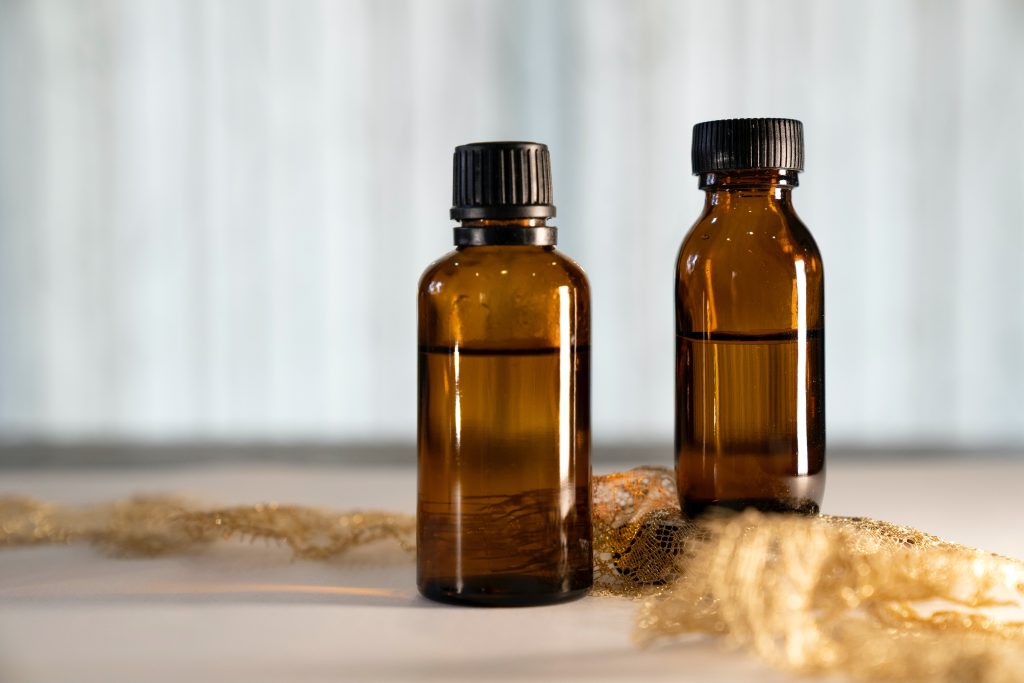
My Top DIY Natural Home Cleaning Recipes
References
- “The Best Essential Oils to Use for a Cleaner, Healthier Home.” Forbes. Forbes Magazine, February 3, 2023. Last modified February 3, 2023. Accessed July 14, 2023. https://www.forbes.com/sites/nomanazish/2023/01/28/the-best-essential-oils-to-use-for-a-cleaner-healthier-home/?sh=6e86fd8f505d.
- “Cleaning Supplies and Household Chemicals.” American Lung Association. Last modified November 17, 2022. Accessed July 14, 2023. https://www.lung.org/clean-air/at-home/indoor-air-pollutants/cleaning-supplies-household-chem.
- “Cleaning Supplies and Household Chemicals.” American Lung Association. Last modified November 17, 2022. Accessed July 14, 2023. https://www.lung.org/clean-air/at-home/indoor-air-pollutants/cleaning-supplies-household-chem.
- “What Is Vinegar and What Makes It a Good Cleaner?” Kitchn. Apartment Therapy, LLC., September 20, 2022. Last modified September 20, 2022. Accessed July 14, 2023. https://www.thekitchn.com/what-is-vinegar-and-what-makes-it-a-good-cleaner-236459.
- “The Power of Hydrogen Peroxide for Cleaner/Disinfectants.” Midlab, Inc. Last modified May 26, 2021. Accessed July 14, 2023. https://www.midlab.com/11/power-hydrogen-peroxide-cleanerdisinfectants/#:~:text=Hydrogen%20peroxide%20is%20incredibly%20effective,infections%20and%20other%20emerging%20threats.
- “What You Should Know about Cleaning with Hydrogen Peroxide.” Hello Homestead. Last modified October 31, 2019. Accessed July 14, 2023. https://hellohomestead.com/what-you-should-know-about-cleaning-with-hydrogen-peroxide/.
- “The Best Uses for Baking Soda.” Almanac.Com. Last modified June 29, 2023. Accessed July 14, 2023. http://www.almanac.com/content/best-baking-soda-uses.
- “How to Clean Your Entire House with Castile Soap.” The Spruce. The Spruce, July 13, 2022. Last modified July 13, 2022. Accessed July 14, 2023. https://www.thespruce.com/use-castile-soap-to-clean-house-1707114.
- “Castile Soap Benefits & 14 Ways to Use It to Clean Every Room.” Mindbodygreen. Last modified February 11, 2022. Accessed July 14, 2023. https://www.mindbodygreen.com/articles/castile-soap.
- “The Best Essential Oils to Use for a Cleaner, Healthier Home.” Forbes. Forbes Magazine, February 3, 2023. Last modified February 3, 2023. Accessed July 14, 2023. https://www.forbes.com/sites/nomanazish/2023/01/28/the-best-essential-oils-to-use-for-a-cleaner-healthier-home/?sh=6e86fd8f505d.
Subscribe
Enjoying our content? Stay up to date on all of our latest posts, subscribe now to receive an email every Friday with our new posts of the week!
